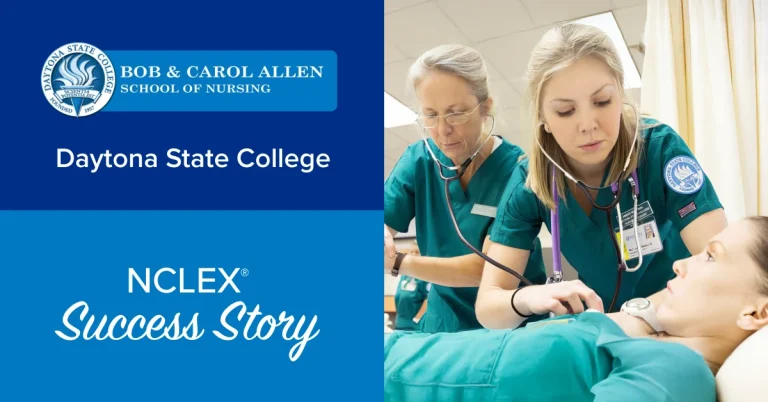We know your priorities as a nurse educator. Whether you need comprehensive NCLEX prep, faculty development resources, or simulation equipment, nursing education grants can strengthen your program and equip students for clinical success. To save you time, we've done the groundwork to connect you with funding options that support you, your department, and your students in reaching their full potential.
Funding for NCLEX-Prep and Nursing Education
Grants for nursing education are more accessible than you might think. Millions of dollars are allocated each year to nursing programs, many on a first-come, first-served basis. 1 Whether you outsource or manage grant applications in-house, abundant nationwide funding makes the grant process worth your time. Additional revenue can expand your budget, allowing you to focus on guiding students from the classroom to clinical success.
How to Apply for Nursing Education Grants
Applying for nursing grants requires an understanding of specific requirements. Begin by identifying the grant programs that align with your institution’s goals and objectives. Each grant typically has unique guidelines, so it's essential to review the eligibility criteria, allowable expenses, and funding timelines to ensure your nursing program fits the criteria for each grant.2
You can either write the proposal yourself or hire a third-party grant writer. Writing the grant in-house lets you maintain control and tailor the proposal to fit your institution’s specific needs. However, it can be time-consuming and may require specialized knowledge. On the other hand, using a professional grant writer can save time and improve your ability to craft a compelling proposal, though it may come with additional costs. Evaluate your resources and decide which approach makes sense for your nursing education program. 2
Next, prepare your application by gathering all necessary documentation, including a project proposal, budget breakdown, and performance benchmarks. Outline how the funding will be used to advance your educational initiatives and support your nursing students in their clinical goals. Be sure to submit your application by the deadline and double-check the submission requirements on the grant provider’s website to avoid any last-minute issues. 2
Federally Funded Grants for Nursing Education
Grant funding comes from many different sources and can be divided into 2 primary categories: federally funded grants and privately funded grants. 2 Federal grants are funded by public revenue sources such as government agencies, public funds, or congressional appropriations.
Several federal grants provide money for nursing education programs each year, giving students the resources and financial aid they need to be career-ready. Here are a few easily accessible federal grant options that can increase revenue for your nursing program:
Perkins Grant
Perkins V, officially titled the Strengthening Career and Technical Education for the 21st Century Act, is the reauthorization of federal funding for vocational education. It allocates nearly $1.4 billion annually to expand access to career education for underserved communities. The Perkins Grant, in various forms, has supported vocational education for over a century. 3
Program Overview:
- Total funding: $1.4 billion annually
- Project period: 3-4 academic years
Allowable Expenses:
- Nursing curriculum
- Certification exams and assessments
- Equipment for nursing instruction
- Teacher salaries and professional development
- Career and Technical Student Organization (CTSO) advisor costs
Eligibility:
- Schools that apply for Perkins V must be one of the following:
- Public schools with Career and Technical Education (CTE) programs
- Nonprofit private schools with CTE programs
- Correctional institutions offering CTE to incarcerated people
- Secondary-level local educational agencies (LEAs) must qualify for a grant of at least $15,000 under the formula to apply for Perkins V. Those with smaller allocations must join a consortium to meet the minimum requirement.
- Schools must offer programs that meet the definitions of size, scope, and quality as outlined in their state's Perkins V plan.
How to Apply:
- Schools should review their state's Perkins V plan, which outlines specific eligibility requirements and performance benchmarks.
- Conduct a comprehensive local needs assessment to determine how funds will be used.
- Submit an application to the state education department, explaining how the funding will be used to advance educational initiatives and meet identified needs.
- Applications need to be submitted by deadlines set in the state plan for the upcoming year.
DOL Grants: Nursing Expansion Grant Program
The Department of Labor’s (DOL) Nursing Expansion Grant Program was established to address the critical shortage of nursing professionals in the U.S. healthcare system. This grant aims to diversify the nursing workforce by providing training opportunities for underrepresented and underserved communities. The program emphasizes creating career pathways that lead to high-quality jobs in nursing, improving healthcare services in communities that need it most. 4
The DOL program has 2 funding tracks: the Nurse Education Professional Track and the Nursing Career Pathways Track. Universities or institutions applying for this grant must carefully consider which track aligns best with their goals, capabilities, and target population. You cannot apply for both categories. 4
Program Overview:
- Total funding: $80 million
- Maximum award: $6 million
- Minimum award: $1 million
- Project period: 60 months
- Estimated number of awards: 25
Allowable Expenses:
- Training and hiring qualified nursing instructors
- Developing pathways for nursing professionals in underserved communities
- Classroom and on-the-job training for nursing assistants and higher-level nursing roles
- Supportive services to reduce employment barriers for aspiring nurses
Eligibility:
- Applicants for this grant must fall into one of the following categories:
- Nonprofit healthcare organizations
- Community-based or faith-based organizations
- Nonprofit educational institutions such as community colleges, Historically Black Colleges and Universities (HBCUs), and Minority Serving Institutions (MSIs)
- Workforce development entities and labor organizations
How to Apply:
- Form a partnership including at least 4 employers, educational institutions, workforce development entities, and community organizations.
- Review the application guidelines on the DOL’s grants website.
- Submit a comprehensive application, including a project work plan and performance measures.
- Applications are due by the deadlines specified in the funding opportunity announcement.
HRSA Grants
The Health Resources and Services Administration (HRSA) offers multiple grant and scholarship programs that focus on supporting educational institutions and healthcare organizations in training, recruiting, and retaining skilled nursing professionals. HRSA’s grants emphasize addressing healthcare disparities by fostering workforce diversity and improving healthcare access in rural and underserved communities. 5
One notable HRSA program, the Nurse Corps Scholarship Program, provides funding to cover tuition and other educational expenses for nursing students in exchange for a service commitment in a Critical Shortage Facility (CSF). Other HRSA funding opportunities, such as the Advanced Nursing Education Workforce (ANEW) and Nurse Education, Practice, Quality, and Retention (NEPQR) grants, target specific needs such as advanced practice training, clinical education, and leadership development in nursing. 5
Program Overview:
- Nurse Corps Scholarship Program: Provides tuition, fees, and a living stipend for nursing students
- ANEW Program: Supports clinical training for nurse practitioners in primary care
- NEPQR: Focuses on nursing education quality, retention, and practice enhancement
- Total funding varies by program, typically ranging from $1 million to $2 million per recipient
- Project period: Generally 12-36 months, depending on the specific program and objectives
Allowable Expenses:
- Tuition and required fees for nursing students
- Living stipends for students during their education
- Development of clinical education programs and partnerships
- Leadership and professional development initiatives for faculty
Eligibility:
- Accredited educational institutions such as community colleges, universities, and nursing schools
- Nonprofit healthcare organizations committed to serving underserved populations
- Institutions providing clinical training in primary care, mental health, and community-based services
How to Apply:
- Identify the HRSA program that aligns with your institution’s needs and goals.
- Review application requirements on the HRSA Grants webpage.
- Submit a complete application, including a proposal narrative, budget plan, and performance measures.
- Applications must be submitted by the deadlines listed on the HRSA website for each specific program.
Nurse Corps Scholarship Program
The Nurse Corps Scholarship Program, funded by the Health Resources and Services Administration (HRSA), provides financial support to nursing students committed to working in underserved areas. This program addresses the national nursing shortage by fully covering tuition and offering a living stipend in exchange for a service commitment at Critical Shortage Facilities (CSFs). The goal is to build a nursing workforce that meets the needs of communities with limited access to healthcare. 6
This scholarship is for individual nursing students. While universities cannot directly apply for the Nurse Corps Scholarship Program, you can play a crucial role in supporting your students' applications and increasing awareness of this opportunity for students who plan to work in underserved areas. 6
Program Overview:
- Total scholarship value: $10,000
- Tuition and eligible fees covered
- Monthly living stipend: Approximately $1,500
- Awards Available: 225
Allowable Expenses:
- Tuition, books, and educational fees
- Educational supplies and equipment
- Monthly living expenses covered
Eligibility:
- Students enrolled in an accredited nursing program (ADN, BSN, or graduate level)
- Students must be U.S. citizens or permanent residents
- Students must be committed to serving in high-need facilities for at least 2 years post-graduation
How to Apply:
- Review guidelines and eligibility criteria on the HRSA Nurse Corps website.
- Submit an online application, including proof of enrollment and financial need documentation.
- Provide additional required documents, such as letters of recommendation and a statement of commitment to serving in a CSF.
- Monitor application deadlines and updates via the HRSA online portal.
Privately Funded Nursing Education Grants
Privately funded grants come from independent, non-governmental sources. This includes businesses and corporations, foundations and nonprofits, and individual donors.1 Consider these attainable private grant opportunities to strengthen the financial standing of your nursing education program.
Robert Wood Johnson Foundation
The Robert Wood Johnson Foundation (RWJF) is a private philanthropic organization focused on various healthcare initiatives. The Robert Wood Johnson Foundation started in 1972 with a generous gift from its founder, Robert Wood Johnson II, who was the CEO of Johnson & Johnson.7
RWJF’s scholarship programs aim to address healthcare disparities and strengthen the nursing workforce by providing financial support to aspiring nurses. RWJF annually develops many different grant programs with varying funding amounts to promote diversity in nursing education and support nurses in underserved communities.7
Program Overview:
- Total funding: Varies by grant program
- Scholarships and grants for nursing education and leadership development
- Project period: Typically 1 to 3 academic years
Allowable Expenses:
- Tuition and educational fees for nursing programs
- Support for leadership development and mentorship initiatives
- Community-based projects to enhance healthcare services
Eligibility:
- Applicants for this grant must fall into one of the following categories:
- Universities
- Healthcare institutions
- Nonprofit organizations
- Priority is given to programs focused on improving equity in healthcare
- Proposals should align with RWJF’s mission to build a culture of health
How to Apply:
- Review active funding opportunities and guidelines on the RWJF website.
- Prepare a proposal emphasizing the impact on nursing workforce diversity.
- Submit your proposal online through the RWJF Grantmaking portal.
- Monitor deadlines for open calls and funding announcements on the RWJF site.
American Nurses Foundation
The American Nurses Foundation (ANF), formed in 1955 as a philanthropic arm of the American Nurses Association (ANA), focuses on advancing the nursing profession through charitable and educational programs.8 ANF offers a variety of scholarship and grant programs, including grants and fellowships for nursing research, scholarships for students pursuing undergraduate and graduate degrees, and additional funding for projects that improve patient care.8
Program Overview:
- Total funding: Various amounts based on the specific scholarship
- Application cycles: Vary depending on the scholarship category
- Award distribution: Annual or semi-annual
- Focus: Undergraduate and graduate nursing students and academic research
Allowable Expenses:
- Tuition and academic fees
- Required course materials, including textbooks and clinical equipment
- Living expenses such as housing and transportation
Eligibility:
- Student Eligibility
- Enrolled in an accredited undergraduate or graduate nursing program
- Demonstrated financial need or academic excellence
- U.S. citizenship or permanent resident status
- Academic Nursing Research Funding
- Must be a registered nurse with a current license
- Must have a master's degree in nursing or be enrolled in a doctoral program
- Present a clinical nursing research topic
- Some grants may have additional requirements, such as:
- Being a current member of the organization offering the grant
- Having a doctoral degree (only some advanced research grants)
How to Apply:
- Review available scholarships on the American Nurses Foundation website.
- Prepare a complete application, including transcripts, personal statement, and letters of recommendation.
- Submit all materials by the specified deadlines for each scholarship category.
Jonas Center for Nursing and Allied Health
The Jonas Nurse Scholars Program, led by the Jonas Center for Nursing and Allied Health, focuses on advancing nursing education by providing scholarships to doctoral nursing students. This initiative aims to address the shortage of nursing faculty and clinical leaders, with a particular emphasis on supporting healthcare workers in veteran communities. The program strives to prepare nursing scholars for leadership roles in healthcare, research, and academia.9
Program Overview:
- Total scholarships awarded: Over 1,200 since the program’s inception
- Focus areas: Nursing leadership, healthcare research, and veterans’ health
- Scholarship duration: 2-3 years
- Partner institutions: 85+ across the United States
Allowable Expenses:
- Tuition and fees for doctoral-level nursing programs
- Research-related expenses and materials
- Travel costs for professional conferences and research dissemination
Eligibility:
- Enrolled in a doctoral nursing program at a partner institution
- Demonstrated commitment to advancing healthcare for veterans and underserved communities
- U.S. citizenship or permanent residency
How to Apply:
- Confirm your institution’s participation in the Jonas Nurse Scholars Program.
- Submit an application through your institution, including transcripts, a research proposal, and letters of support.
- Meet specific deadlines set by your institution for internal selection processes.
Securing funding can transform your nursing program, empowering you to provide students with the tools, training, and resources they need to excel. By exploring these grant opportunities, you can support your faculty, enhance learning environments, and increase student success on the NCLEX and beyond. Remember, grants are within reach, and with a clear plan and timely application, you can unlock new resources to strengthen your program. Start today, invest in the future of your department, and give your students every advantage on their journey to becoming skilled, confident nurses.
References
- National Education Foundation. (n.d.). How to apply for a grant. https://www.n-e-f.org/apply.html
- ATI Testing. (2022, November 29). How to write a grant: Tips and best practices. https://www.atitesting.com/educator/blog/knowledge/2022/11/29/write-a-grant
- Office of Career, Technical, and Adult Education. (n.d.). Carl D. Perkins Career and Technical Education Act (Perkins V). U.S. Department of Education. https://cte.ed.gov/legislation/perkins-v
- New York State Department of Labor. (n.d.). Funding opportunities. https://dol.ny.gov/funding-opportunities-0
- Health Resources and Services Administration. (n.d.). About HRSA. https://www.hrsa.gov/about
- Health Resources and Services Administration. (n.d.). Nurse Corps Scholarship Program fact sheet. https://bhw.hrsa.gov/sites/default/files/bureau-health-workforce/funding/nurse-corps-scholarship-program-fact-sheet.pdf
- Robert Wood Johnson Foundation. (n.d.). Grants and funding opportunities. https://www.rwjf.org/en/grants.html
- American Association of Colleges of Nursing. (n.d.). Scholarships and financial aid for nursing students. https://www.aacnnursing.org/students/scholarships-financial-aid
- American Association of Colleges of Nursing. (n.d.). Jonas Nursing and Veterans Healthcare. https://www.aacnnursing.org/jonas-nursing
- NurseJournal. (2024). Nurse Corps Scholarship Program 2024: Guide to Funding Your Nursing Education. https://nursejournal.org/articles/nurse-corps-scholarship-program-2024/
- Robert Wood Johnson Foundation (RWJF). (2020). Pioneering Ideas: Exploring the Future to Build a Culture of Health. https://www.rwjf.org/en/grants/active-funding-opportunities/2020/pioneering-ideas-submission.html
- Robert Wood Johnson Foundation (RWJF). (n.d.). Awarded Grants. https://www.rwjf.org/en/grants/awarded-grants.html
- American Association of Colleges of Nursing (AACN). (n.d.). Foundation Scholarships. https://www.aacnnursing.org/foundation/scholarships
- Foundation of the National Student Nurses’ Association (FNSNA). (n.d.). Undergraduate Scholarships. https://www.forevernursing.org/undergraduate-scholarships.html
- Jonas Philanthropies. (n.d.). Jonas Scholars Program. https://jonasphilanthropies.org/jonas-scholars/
- Rural Health Information Hub. (n.d.). Funding & opportunities. https://www.ruralhealthinfo.org/funding
- Advance CTE. (n.d.). Career Tech Blog. https://blog.careertech.org
- Foundation of the National Student Nurses’ Association. (n.d.). Undergraduate scholarships. https://www.forevernursing.org/undergraduate-scholarships.html
- American College of Education. (n.d.). Nursing scholarships. https://ace.edu/tuition-and-admissions/grants-scholarships/nursing-scholarships/
- WorkforceGPS. (n.d.). About National Emergency Grants (NEGs).









